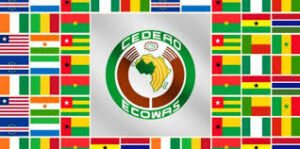The Economic Community of West African States (ECOWAS) is grappling with a significant challenge as the military leaders of Mali, Niger, and Burkina Faso have formed the “Confederation of Sahel States,” boycotting the recent summit of West African leaders. This move threatens regional stability and the unity of the bloc.

The formation of the Confederation of Sahel States marks a critical juncture for ECOWAS, which has been struggling with various issues, including jihadist violence, financial difficulties, and the challenges of establishing a regional force. The military rulers of the three breakaway countries declared their union as a stance against what they perceive as France’s interference in the region.
ECOWAS has expressed serious concerns about the potential “disintegration” of the region due to this new confederation. The head of the ECOWAS Commission, Omar Alieu Touray, highlighted the risks of political isolation, loss of funding, and impeded freedom of movement that could result from the withdrawal of these Sahelian countries. Touray also warned that the secession would exacerbate regional insecurity and disrupt plans for a regional force to combat terrorism and restore constitutional order.
In response, Nigeria’s President Bola Ahmed Tinubu has called on Senegal’s President Bassirou Diomaye Faye to act as a special envoy to the breakaway states. This move aims to persuade Mali, Niger, and Burkina Faso to reconsider their departure from the bloc and mitigate the risk of further instability.
The juntas in Niger, Mali, and Burkina Faso have come to power through coups in recent years and announced their intention to leave ECOWAS in January. They accuse Paris of manipulating the bloc and failing to provide sufficient support in their fight against jihadist groups. This discontent with France’s influence and ECOWAS’s perceived inefficacy in addressing security concerns has fueled their decision to form a new union.
General Abdourahamane Tiani of Niger articulated the group’s stance, emphasizing the desire to establish a community independent of foreign powers. At the Sahel group meeting in Niamey, he stated, “Our people have irrevocably turned their backs on ECOWAS,” firmly rejecting any pleas for reconciliation from the bloc.
Despite the stark positions of the Sahel states, there have been calls for renewed dialogue. Senegal’s President Faye, participating in his first ECOWAS summit, stressed the importance of preventing the withdrawal of Mali, Niger, and Burkina Faso. He advocated for reforms within ECOWAS to better address contemporary challenges and realities.
The strained relationship between Niger and ECOWAS particularly deteriorated following the July 2023 coup that brought Tiani to power. ECOWAS’s imposition of sanctions and threats of military intervention to reinstate ousted President Mohamed Bazoum only served to deepen the rift. Although the sanctions were lifted in February, the relationship remains fraught with tension.
As ECOWAS contemplates its next steps, the focus is also on how to fund and deploy a regional force to tackle terrorism and uphold constitutional governance. There are proposals for an initial 1,500-member unit, potentially expanding to a brigade of 5,000 soldiers, with an estimated annual cost of $2.6 billion. However, ECOWAS’s financial difficulties complicate these plans, as Touray has indicated a “dire financial situation.”
President Tinubu’s continuation as ECOWAS chair, despite rumors of a rift over his reappointment, underscores the need for strong leadership as the bloc navigates this crisis. The outcome of the ongoing negotiations and efforts to bring the breakaway states back into the fold will be critical for the future stability and unity of West Africa.
The creation of the Confederation of Sahel States by Mali, Niger, and Burkina Faso poses a serious threat to the cohesion of ECOWAS and regional stability. The bloc’s efforts to address this challenge through diplomacy and potential reforms will be crucial in determining the future landscape of West African politics and security.




